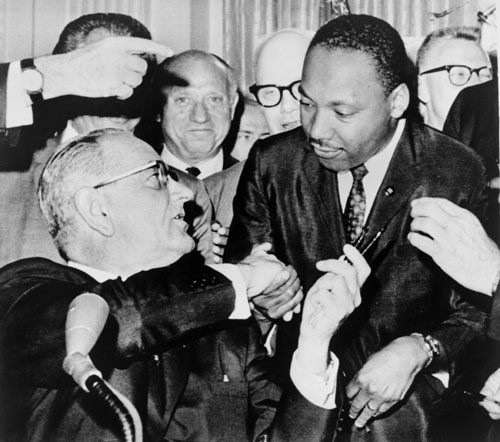The Voting Rights Act Was Made for a Simpler Time
That day is gone, and fortunately, it's not coming back.

Political advocates often yearn for simpler times and simpler causes. Conservative hawks, nostalgic for the clarity of World War II, see every aggressive nation as Nazi Germany. Tea partiers invoke the founders as though King George III were still on his throne.
For liberals, there is no cause to match the cause of civil rights in the 1960s -- when Southern segregationists violently opposed equality for African-Americans and the federal government acted assertively in pursuit of justice. When it comes to any issue involving race, these liberals have a pronounced tendency to spy the ghost of George Wallace.
That impulse was on display Tuesday, after the Supreme Court struck down a major part of the federal Voting Rights Act of 1965. That provision required nine states, mostly in the South, to get federal approval before making the slightest change in election laws and procedures. The reactions made it sound as though the term "black voter" will soon be a self-contradiction.
"No one should be fooled by the naive fantasy that voting discrimination no longer exists," said Wade Henderson, head of The Leadership Conference on Civil and Human Rights. The Amalgamated Transit Union said the verdict "turns the clock back to the Jim Crow era." Illinois Gov. Pat Quinn said it "halts nearly 50 years of civil rights progress."
Quinn's comment was especially illuminating, though not for the reason he intended. Illinois is one of the states that the law treats as fit to exercise control over elections. But as the lawyers for Shelby County, Ala., told the Supreme Court, it was among six uncovered states that lost more voting discrimination lawsuits than five of the covered states.
The court didn't say racism and voting discrimination are things of the past. It merely said that they are not peculiar to the South, or necessarily more prevalent in the South.
Texas and South Carolina wanted to require voters to present a government-issued photo ID when they show up at the polls. Under the Voting Rights Act, they were barred from doing so. Indiana wanted to impose the same rule. It was allowed.
Was this because the requirements were radically different? No. Because there are black people in Indiana? No. Because Hoosiers get driver's licenses at birth? No.
It's because what qualifies as racial discrimination in some places does not qualify as racial discrimination there. Not that black voters have it better in Indiana. In fact, they are less likely than blacks in Texas and South Carolina to be registered and less likely to vote.
The unequal treatment of states has been the law since 1965. Southern states had shown a virulent determination to keep African-Americans from voting by any means. Special scrutiny made sense then. It doesn't make much sense now.
Under the section of the law that was overturned, what states actually do isn't important. What matters is what they did -- decades ago. And that criterion was scheduled to remain in effect until 2031.
But the modern South is a place Bull Connor wouldn't recognize. In 1965, only 6.7 percent of Mississippi's black adults were registered to vote. In 2004, the African-American registration rate was 76.1 percent -- vs. 72.3 percent for whites. Other Southern states have made huge gains, too.
But they still had to get federal approval of every change in voting procedures. This might make sense if they were still attempting to disenfranchise minorities. But as a dissent in the appeals court documented, the Justice Department raised "only five objections for every ten thousand submissions between 1998 and 2002." Judge Stephen Williams noted, "In the vast majority of cases, the overall effect … is merely to delay implementation of a perfectly proper law."
The court's critics will say such widespread compliance proves the Voting Rights Act deters bad actors. By this logic, there are never grounds for changing it. Discrimination proves the need, and so does nondiscrimination.
If the feds want to treat a state by a stricter standard, they should base that treatment on what is actually happening today. States that have not changed should get tough scrutiny. Those that have gotten worse, ditto. But those that have good records should be treated like grownups.
Simple issues are made for simple, satisfying solutions. Complexity is harder. The Voting Rights Act was made for a simpler time. That day is gone, and fortunately, it's not coming back.


Show Comments (110)